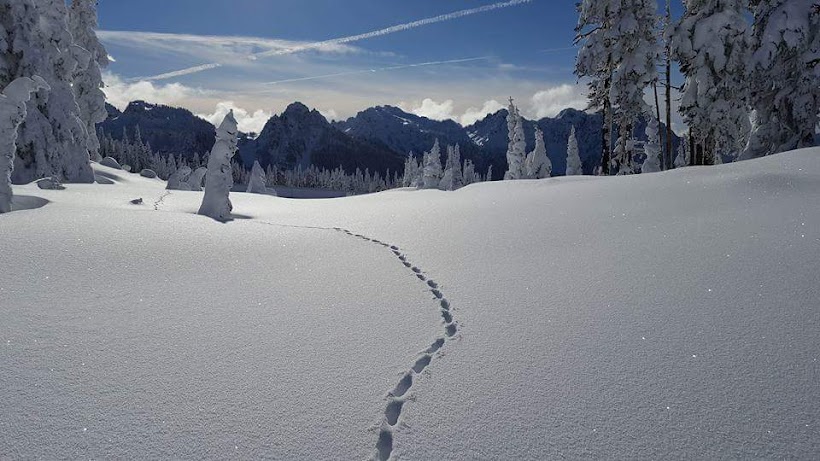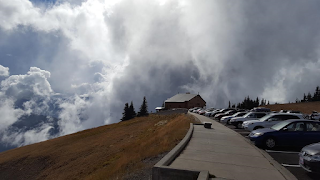The cloud cover seemed low in the arctic. It gave me the impression of being on top of the world, so high that even the sky reached the earth. I stood on a hill surrounded by dwarfed pines and lichen in Denali National Park. The mountain itself was shrouded in clouds. I would not see it that day. What I would see is a rolling wilderness that went on for 100 miles in any direction--that feeling of solitude so profound you can eat it for breakfast. Down in the valley before me, a bull moose stood torso deep in a lake dipping his head under the water in search for sustenance.
My mind was, as it is for many who venture out of their vehicles in the Alaskan wilderness, was the Alaskan grizzly. Majestic. Powerful. Even romanticized. You couldn't help walking in this country without thinking about the bear. For here is their home. They live everyday in the solitude I write about. Here in Denali, their livelihood is relatively unchallenged.
But elsewhere in Alaska, and almost the entire lower 48, they are challenged to the point of being endangered. Considering that at one time, this majestic beast once roamed nearly all of America, and even dwelt in Mexico. Today, they live in pockets of Washington, Idaho, Montana and Wyoming. South of solitude. Their only true stronghold is in Canada and Alaska.
And I have hiked in both Alaska and south of solitude. There's something different about walking in the wilds of Alaska and then returning to, say, the Cascades, the Sierra Nevadas, or even much of the Rockies. For many, south of solitude is wild, deep and impenetrable. For me, every time I walk in what once was grizzly country, but hasn't had a grizzly for over 100 years, something is missing. It almost feels like there is no solitude there. It feels like I can turn around at any moment and see another person, a town, or a highway just past the trailhead. It's a terrible feeling to undergo for someone who'd spent a lot of time in the mountains prior to moving to Alaska.
Where there is wilderness left in Alaska, it's dwindling, just as it is everywhere in our human controlled world. At one time, humans lived in harmony with all the animals. Today, it's about development, revenue, and recreation. But the more we develop, the more money we make from that development, the less solitude any of us will feel in the back country. One day we may return to the wild places to find the grizzly completely gone. There's a sadness to that thought. For there too, even in Alaska, will be south of solitude.
Alaska Eagle is a journalistic approach to stories, photographs and video created by author, photographer, journalist ranger and filmmaker John Stoeckl. Some of the posts are being put into his new book project Reflections in the Ice.
Winter

Tracks in the Snow. Photo by John Stoeckl
Friday, November 25, 2016
Tuesday, November 15, 2016
Rain on the Peninsula
It's been raining quite constantly since my return to the Washington peninsula of Olympic. Almost at a constant rhythm, it only quiets for a few minutes, a few hours, or maybe a day. Then the pelting continues.
 I spent my summer on the Olympic peninsula as a ranger and guide. I look at these experiences as something more to add to my files--those things I can refer back to on occasion. I lived by a lake. A cold clear lake carved by a glacier. I then drove to town, caught the route south and up to the ridge where I led guided hikes or talks. I learned to talk about Douglas and subalpine fir, western and mountain hemlock and of western red cedar. I learned to add intangibles, universals and emotional human connections to that which is nature. I connected salmon with glaciers and climate change.
I spent my summer on the Olympic peninsula as a ranger and guide. I look at these experiences as something more to add to my files--those things I can refer back to on occasion. I lived by a lake. A cold clear lake carved by a glacier. I then drove to town, caught the route south and up to the ridge where I led guided hikes or talks. I learned to talk about Douglas and subalpine fir, western and mountain hemlock and of western red cedar. I learned to add intangibles, universals and emotional human connections to that which is nature. I connected salmon with glaciers and climate change.
There was a lot of sun up there during the summer. And the crowds were enormous for a place that is supposed to be a refuge from life. Crowds, like the rain, seemed to pelt in constant rhythm that only subsided for a moment, an hour or a day. But some days were quiet. Usually I'd search for those quiet places for which I could retreat, take in a sight and be alone for, if nothing else a moment. One time I stood at the edge of an overlook among tall subalpine firs. I was at an elevation of around a mile up, but only a mile away from the visitor center for which I spent most of my time. I felt reflective that day--searching for a spiritual sense of self. The crowds had overwhelmed me. As an introvert, I needed quiet. Then something caught my eye. A shadow above me. I looked up to see the blood red wings of a red tail hawk. It swooped over me as if to wonder what I was and why I was there. Or it was to send me a message that this is a place untrammeled and I am suspect to being welcomed in his part.
But now the summer season has moved on to fall. A quiet descends upon my lake. I no longer climb to the ridge for work and haven't seen it for over a month. The sounds of the crowds have been replaced by rain. Tears of joy. Tears of life. Tears of pain. They are constant. And long after I've gone, they will continue coming down for a few minutes, a few hours, or a few days.
 I spent my summer on the Olympic peninsula as a ranger and guide. I look at these experiences as something more to add to my files--those things I can refer back to on occasion. I lived by a lake. A cold clear lake carved by a glacier. I then drove to town, caught the route south and up to the ridge where I led guided hikes or talks. I learned to talk about Douglas and subalpine fir, western and mountain hemlock and of western red cedar. I learned to add intangibles, universals and emotional human connections to that which is nature. I connected salmon with glaciers and climate change.
I spent my summer on the Olympic peninsula as a ranger and guide. I look at these experiences as something more to add to my files--those things I can refer back to on occasion. I lived by a lake. A cold clear lake carved by a glacier. I then drove to town, caught the route south and up to the ridge where I led guided hikes or talks. I learned to talk about Douglas and subalpine fir, western and mountain hemlock and of western red cedar. I learned to add intangibles, universals and emotional human connections to that which is nature. I connected salmon with glaciers and climate change. There was a lot of sun up there during the summer. And the crowds were enormous for a place that is supposed to be a refuge from life. Crowds, like the rain, seemed to pelt in constant rhythm that only subsided for a moment, an hour or a day. But some days were quiet. Usually I'd search for those quiet places for which I could retreat, take in a sight and be alone for, if nothing else a moment. One time I stood at the edge of an overlook among tall subalpine firs. I was at an elevation of around a mile up, but only a mile away from the visitor center for which I spent most of my time. I felt reflective that day--searching for a spiritual sense of self. The crowds had overwhelmed me. As an introvert, I needed quiet. Then something caught my eye. A shadow above me. I looked up to see the blood red wings of a red tail hawk. It swooped over me as if to wonder what I was and why I was there. Or it was to send me a message that this is a place untrammeled and I am suspect to being welcomed in his part.
But now the summer season has moved on to fall. A quiet descends upon my lake. I no longer climb to the ridge for work and haven't seen it for over a month. The sounds of the crowds have been replaced by rain. Tears of joy. Tears of life. Tears of pain. They are constant. And long after I've gone, they will continue coming down for a few minutes, a few hours, or a few days.
Subscribe to:
Posts (Atom)
